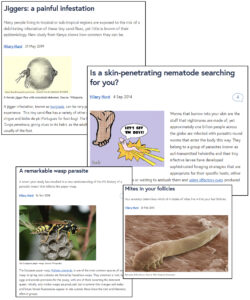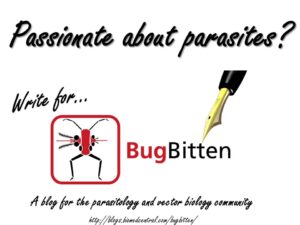
I find it hard to believe that 10 years have passed since the BugBitten blog was born. Initiated by board members of Parasites & Vectors and hosted by the journal, a small group of enthusiastic volunteers and a BioMed Central staff member launched into the new experience of writing blogs, with the objective of publicising and discussing all aspects of parasitology and vector biology.
Since then, a handful of bloggers (editors) regularly prepare blogs on topics we are interested in, and think will interest our community. Each week, one of the editors is assigned to check and edit the upcoming blog. We also welcome guest bloggers, many of whom have eventually become editors.
How are we doing?
Taking stock of the past decade has provided some surprises. An examination of our statistics shows that we are maintaining our aim of publishing at least one blog a week, with 23 posts so far this year, and 52 since September 2022.
At the time of writing, we have had a staggering 2,396,892 page views since we began publishing blogs in September 2013, with readership increasing steadily over the years. All published blogs remain available to view on the BugBitten platform and views steadily increases over time, from an average of 4,000-5,000 during the first few months to over 10,000 a few years later.

Our expectation is that our readers have, at least a limited, knowledge of biology, and range from undergraduate students to lecturers, research team leaders and other professionals. However, some topics have clearly caught the attention of the general public. For example, a blog published in 2019 and concerning jiggers, tiny fleas that burrow into human skin, has beaten all others with 320,433 views to date, and other human infections following close behind.
Our beginnings
After an introductory blog featuring the editors at the time, we first discussed a method to assess the impact of research, other than counting citations. Altmetric statistics are mostly based on social-media attention as opposed to citations. Impact is visualised as a multicoloured donut with a score in the centre. At the time, the conclusion was that publications relating to parasitology or vector biology would achieve a very low score, not because the public was uninterested in these topics but because the community were not using methods such as twitter (now X) and Facebook to communicate their results. Hopefully the BugBitten blog and twitter feed have contributed in some small way towards addressing this concern.
Our coverage
Since 2013, topics covered by our blogs have ranged far and wide, reporting on recent research publications, health and medical issues associated with infectious diseases and features specific to the developing world.
Blogs concerning human parasites of all sorts have predominated with, unsurprisingly, malaria the one most covered (in various guises from cell biology to epidemiology). Parasites of veterinary importance have often appeared, but we have not forgotten some of the fascinating organisms infecting wildlife. Many of these wildlife infections alter their host’s life history to enhance their chances of transmission to the next host in ways that can only be wondered at. Though rarely the subject of funded research programmes, these stories have inspired some of my students to seek a career in parasitology or vector biology.
Insects, arachnids, and snails that act as vectors of parasites have also been the focus of many blogs with their life histories, behaviour and control or eradication discussed.
Over the past decades, we have given good coverage to newly recognised concerns. For example we first blogged about the outbreak of Zika disease in January 2016, and covered this several times in the following couple of years, with a return to this topic in 2022 when a guest editor reported the identification of a new mosquito vector for this flavivirus.
Srimathy Sriskantharajah, the BioMed Central staff member who has been involved as a blogger and facilitator since the beginning of BugBitten, says:
“One thing I have noticed from reading the blogs is that they illustrate how parasitology is not just an ‘academic’ subject, it has real world implications – whether it is discussing a new malaria vaccine or bugs in our Christmas trees!”
In 2015, we first flagged climate change as of concern for potentially facilitating the spread of parasitic diseases into new areas. New stories with this theme have been covered since then, with increased attention in the last two years.
Views from our editors
Over the past decade several editors have joined us for a few years, then moved on to other things, often when changing careers. Their contributions have all been greatly valued. Currently we have 6 volunteer editors and two from BioMed Central, three of whom have been contributing since 2013. Here is what some of them enjoy about BugBitten:
Krisztian Magori: It’s amazing that we’ve been blogging for a decade. BugBitten has provided me with an avenue to keep up to date on the current research in vector-borne diseases. It started as a way for me to put my name out there and participate in public outreach. Now, I work at an institution where me and my students are the only people working on vectors and vector-borne diseases, so it has been nice to be part of the bigger community, to not feel so isolated. It also allowed me (and my students) to share what we do in a more relaxed and flexible way compared to peer-reviewed publications. I’m excited to see where it will go in the future, and I’m looking forward to reading future posts from all my co-editors.
Daniel Parsons: “Reading, writing, and editing BugBitten blogs over the last three years has been highly enjoyable and rewarding, and has enabled me to keep up to date on advancements and news in the wider field of parasitology and vector-borne diseases during my PhD. Reading blogs from the other editors and writing my own is always a highlight, and it is refreshing to do something a little different from my own work each month.”
Tim Little: “I’m a new writer and editor for the blog, but I have every plan to continue with contributing. If dinosaurs and cool documentaries on TV get kids into science, then sci comms and writing is what pushes teenagers into pursuing it further. At least, that’s my experience! Each piece is a chance to learn something new, and hopefully help other people get to grips with important work. Now that I’m moving away from infectious disease in my academic life, I hope BugBItten will keep me anchored to one of my great interests, not least because of the increasing importance of such diseases in a warming world.”
Anouk Gouvras: “I love contributing to BugBitten because it’s a collaborative, community blog, written by and for fellow parasite and vector research enthusiasts, from different disciplines, career stages, organisations and countries. BugBitten gives me the opportunity to read and write about new parasite and vector research outside my area of expertise and it’s a fun and motivating way to develop my science communication skills.”
And my thoughts
As a lecturer, one of my passions was to share my fascination with the intriguing life histories of parasites, while as a research supervisor, I encouraged my team to read as widely as possible, knowing that new ideas and approaches can come from far-removed fields. Initially my hope was that BugBitten blogs would achieve these aims by providing our readers with a weekly glimpse into new topics that would inform, fascinate, and inspire them. I hope that the blog is doing this and will continue to do so.
If you would like to contribute a guest blog to BugBitten please initially contact me at h.hurd@keele.ac.uk.

Comments